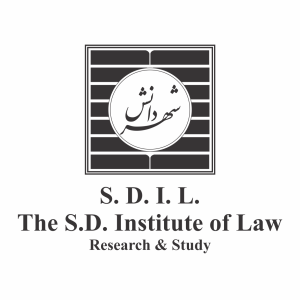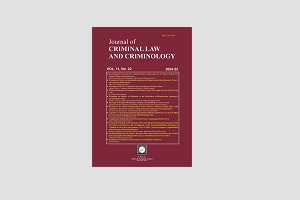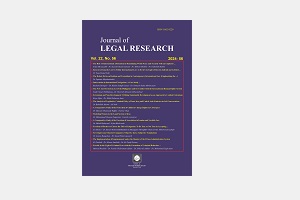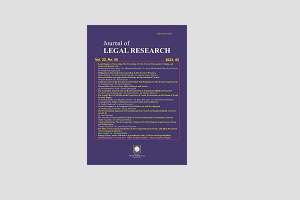Journal of
Legal Research
Number 8
Vol. IV No. 2
Autumn 2005 – Winter 2006
Managing Editor: Vahid Eshtiagh
Editor-in-Chief: Seyyed Ghasem Zamani
Contents
Articles
Commercial Code of Iran in the Process of Revision
Mohammad Reza Pasban (Ph.D.)
International Standards of Human Rights and Fight against Terrorism
S. Ghasem Zamani (Ph.D.)
Jus ad bellum: Appraising the Report of The UN High-Level Panel on the Threats, Challenges and Change
Nader Saed (Ph.D.)
The Age Criterion to Vote in General Elections: Iran and Comparative Law
International & Public Law Research Group of SDIL
The Execution of Judgments of the European Court of Human Rights
JÎrg Polakiewicz, Translated by Maziar Peyhani
Special Issue: Insurance Law in National and
Comparative Law
Obligation to Good Faith in Life Insurance Contract
Mostafa Elsan
Direct Action and Injured Party Reference to Insurer
Abdollah Khodabakhshi
General Average in the Marine Insurance Law
Kambiz Raadi
WTO Principles on Insurance Services and the Legal Effects of Iran’s Accession to It
Mohsen Sadeghi
Bill of Commercial Insurance: An Effort for Removing the Ambiguities in the Iranian Insurance Code
Mansoor Amini (Ph.D.)
Critique and Presentation
Judgment of the Iranian Court in Hemopilian Case: A Modern Approach to Civil Liability of the Government in the Iranian Jurisprudence
Jamal Seifi (Ph.D.)
The European Union’s Judicial Cooperation Unit (Eurojust)
Ali Khaleghi (Ph.D.)
Articles
Commercial Code of Iran in the Process of Revision
Mohammad Reza Pasban (Ph.D.)
Abstract:
The amendment of the commercial code particularly companies regulations,
has been a concern of the legal as well as business communities. With
inevitable developments in this field in other countries and the EU
Community’s trend towards a unified company law through mandatory
directives for the member States, the development in this regard has been
intensified. This is the case while the Iranian legal system has not witnessed
any move in the same line. The cabinet’s decision to take this necessity into
account focussing on the companies, is regarded as a crucial step to
implement that objective. This important decision which was accomplished
based on all established scientific- research methodologies, finally in the form
the cabinet Bill went to the Parliament.
International Standards of Human Rights
and Fight against Terrorism
Seyed Ghasem Zamani (Ph.D.)
Abstract:
Enhanced attention to terrorism and to the effects of counter-terrorism
measures on the enjoyment of human rights is currently driven of course, by
the events of 11 September 2001 and the ensuring global war against
terrorism. International standards of human rights recognize the duty of
States to protect those living within their jurisdiction from terrorism. On the
other hand, respect for human rights and fundamental freedoms is essential
tools in the effort to combat terrorism.
Jus ad bellum: Appraising the Report of The UN High-Level
Panel on the Threats, Challenges and Change
Nader Saed (Ph.D.)
Abstract:
First years of the twenty-first century is a decisive moment in the human story
in which, different societies are interconnected as well as face threats that no
nation can hope to master by acting alone. In 2003, The UN Secretary
General established a High-Level Panel on Threats, Challenges and Change to
suggest how nations can work together to meet this formidable challenges.
This paper critically analyzes the 2004 Report of the Panel and international
developments on use of force inter alia, preemptive self-defense in light of jus
ad bellum. The author concludes that the recommendations provided by the
Panel are primarily not useful to effective maintenance of international peace
and security.
The Age Criterion to Vote in General Elections:
Iran and Comparative Law
International & Public Law Research Group of SDIL
Abstract:
Nowadays the representative democracy i.e. application of sovereignty by
people’s representatives, is a common principle in theory and practice of
public law. Definition of the people as electors or voters is an important issue
in this situation. In all countries, “age” is recognized as a criterion for electors,
but its quantity is not consistent. In legal viewpoint, more quantity of the age
and suffrage, more the quality and logic in decisions of electors. This article
analyzes the age criteria to vote in Iranian legal system and comparative
election law. The article concludes that Iranian election laws shall be amended
and increase the age threshold of voting from 15 and/or 16 to 18 years old.
The Execution of Judgments of the European Court
of Human Rights
Jorg Polakiewicz, Translated by Maziar Peyhani
Abstract:
Judgment of the European Court of Human Rights in which the Court finds a
breach of the convention, imposes on the respondent State a legal obligation
to put an end to the breach and make reparation for its consequences in such
a way as to restore as for as possible the situation existing before the breach.
However the exeution of some recent judgments has given rise to considerable
problems which threaten to undermine the credibility of the whole system.
Obligation to Good Faith in Life Insurance Contract
Mostafa Elsan
Due to modern modifications in legal concepts and tendency to actualizing
pragmatic ethical notions, in the light of acts and provisions, “Principle of
Good Faith” conducts as one of undeniable bases for survey of applicability of
parties’ contract. This principle has impression in all stages of the relation
between parties from negotiations to formation, enforcement and
interpretation of contracts. Principle of good faith sometimes, coincided with
some legal facts and applied to completion of agreement, too. Perhaps, “Life
Insurance Contract” is the best example for the contractual structure that has
this principle in all times and worldwide. The existence of principle or its
absence in life insurance contracts has legal consequences. In this paper, we
are speaking about position and content of good faith in life insurance
contract. These surveys include study of national and comparative laws.
Direct Action and Injured Party Reference to Insurer
Abdollah Khodabakhshi
The appearance of insurance has been effect upon law of civil liability and
changed its rules. In addition to change of substantive rules of civil. liability,
e.g. transformation of foundation, principles and its contexts, it changed
procedural rules, quality and quantity of actions.
One of this effects is the existence of especial action that, contrary to
private principle of contract, draw direct relationship between injured party a
possibility of direct reference to injure for recovery of damage.
This article present, in view of future revolution of civil liability law and
insurance in Iran necessity of awarness with insurance actions.
General Average in the Marine Insurance Law
Kambiz Raadi
Although, the rule of General Average, which is in the among of the most
famous and important rules of marine law & practices, is not unknown in
Iran, but due to the essential lack of Iranian statute law in this regard, it has
never been studied, discussed and/or searched as the subject of academic
researches. Also, the courts practices are silent and there is not any precedent
established in this regard. Furthermore, concerned limited provisions
incorporated in Iranian Marine Code 1967 have been practically abandoned.
So, it is of great importance and prompt necessity to pass local provisions
and enrich the statute law in this regard. In this article, considering the lack
and absence of local statute law in respect of General Average, and
consequently, absence and lack of practices, Iranian legal principles, rules and
bases have been reviewed. The conclusion is that, till passing of such special
code and provisions governing the General Average matters, all legal disputes
in this regard could be settled according to the rule of “Administration of
property belonged to others” enacted by Iranian Civil Code, Article No: 306.
WTO Principles on Insurance Services
and the Legal Effects of Iran’s Accession to It
Mohsen Sadeghi
Today, Iran’s accession to WTO has become an undeniable necessity. A part
of WTO regulation i.e. regulations of General Agreement on Trade Services
(GATS) provides for general principles on insurance services in international
trade, such as principle of national treatment, principle of most-favored
nation, principle of accession to market, principle of transparency and
principle of equitable performance of domestic regulations.
Since these principles have been provided for services liberalization and
our country, Iran, should change or amend insurance regulations that
contrastable with WTO principles.
In this article, we want to survey WTO principles on insurance services
regulations and Iranian contrastable regulations on insurance services and
then suitable solutions.
Bill of Commercial Insurance: an Effort for Removing of
Ambiguities in the Iranian Insurance Code
Mansoor Amini (Ph.D.)
The Iranian Insurance Code has beed enacted 70 years ago. Harmonisation of
the code with recent developments is an important function of the parliament.
The bill of commercial Insurance which reffered to Islamic consulative
Assembly in 27 Tir 1384, has tried to modify the Iranian Insurance Code. The
present article examines the bill and its comparsion with the Iranian and
French commercial codes.





